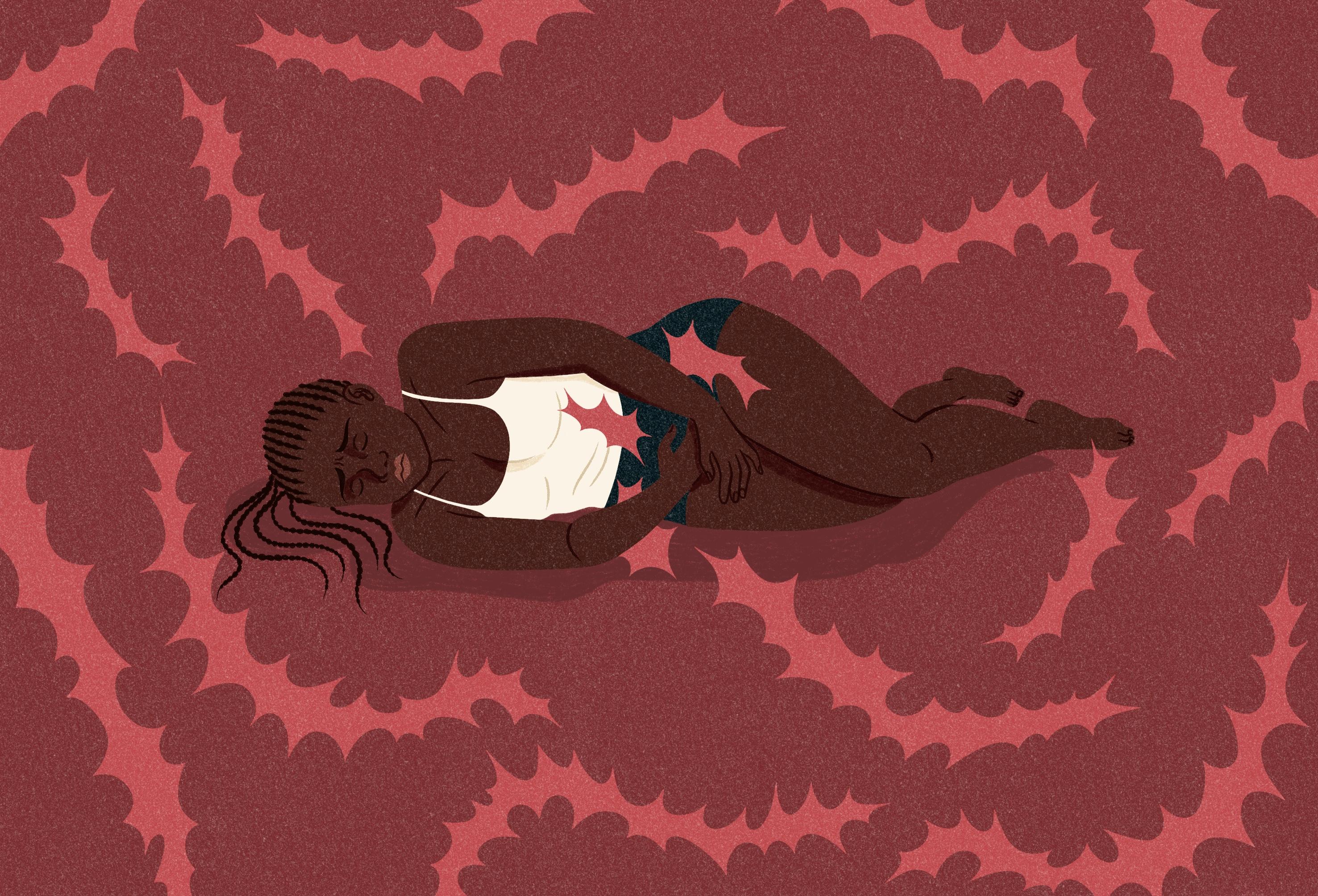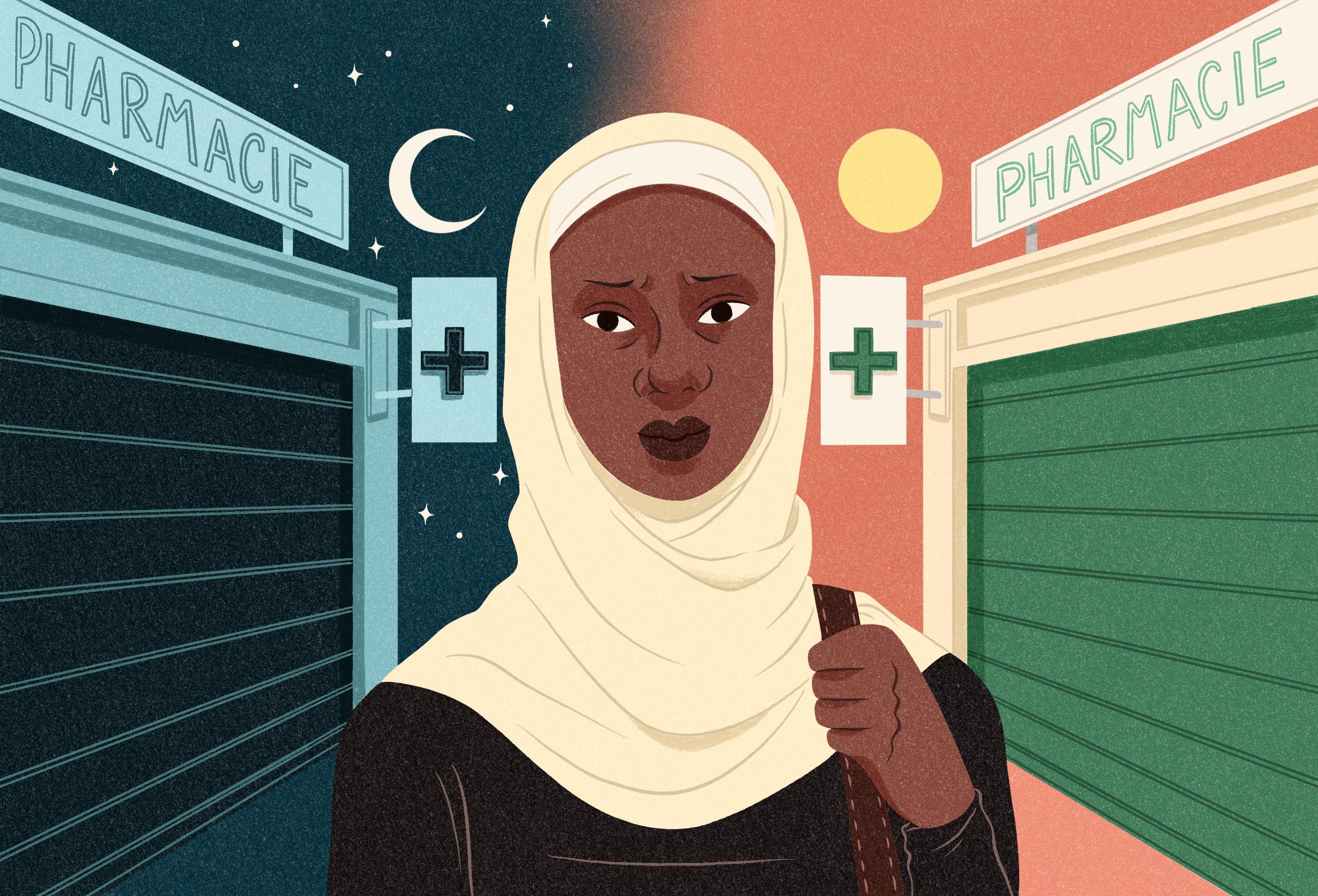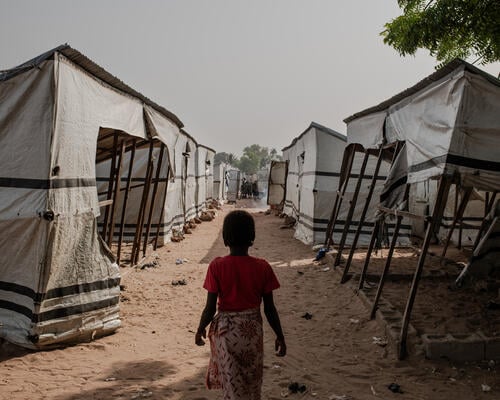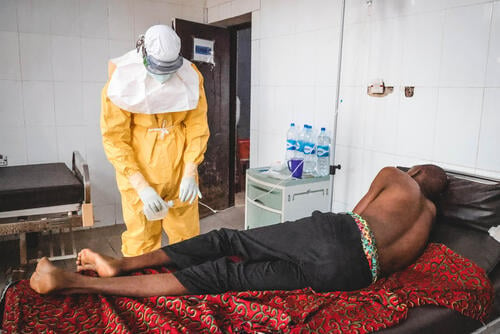Severe complications following unsafe abortions are up to seven times more likely in two hospitals in fragile and conflict-affected settings. These are the findings of one of the very first studies on the subject, carried out in two referral hospitals in Bangui in the Central African Republic and Jigawa State in northern Nigeria. Behind the statistics, real stories of real women – and a universal vulnerability.
“I was distraught. I had drunk the traditional medicine. Before that, someone had shown me how to insert a piece of iron into my vagina... It was a piece of iron like this [she shows the interviewer the size],” says Rasha*, a 32-year-old woman admitted to Bangui referral hospital with potentially life-threatening abortion-related complications.
“This person told me it would dilate the cervix, but it didn't work ... She also told me to boil the roots of a plant called Kava with natron [sodium carbonate] and then drink the mixture. After drinking it, I didn't feel well. I felt sick to my stomach and dizzy. My stomach was churning. I couldn't get out of bed. The pains were intense,” she says.
Around 70 per cent of maternal deaths occur in sub-Saharan Africa.Trends in maternal mortality 2000 to 2020: estimates by WHO, UNICEF, UNFPA, World Bank Group and UNDESA/Population Division https://www.who.int/publications/i/item/9789240068759 Among the five main causes are abortion-related complications - an area in which little progress has been made in recent decades. Yet most abortion-related deaths are the result of unsafely induced abortions,Grimes DA, Benson J, Singh S, Romero M, Ganatra B, Okonofua FE, et al. Unsafe abortion: the preventable pandemic. Lancet [Internet]. 2006 Nov 25 [cited 2020 Jul 13]; 368(October):1908–19. https://pubmed.ncbi.nlm.nih.gov/17126724/ which could be largely avoided by providing comprehensive abortion care, including post-abortion care, contraception and safe abortion services.

The AMoCo** study, conducted by Médecins Sans Frontières (MSF), Épicentre, Institut Guttmacher and Ipas, in partnership with the Nigerian and Central African Ministries of Health, shows that severe complications were five to seven times more frequent in the two referral hospitals studied than in African hospitals in the more stable settings studied by the World Health Organisation (WHO) using a similar methodology.Qureshi, Zahida & Mehrtash, Hedieh & Kouanda, Seni & Griffin, Sally & Filippi, Veronique & Govule, Philip & Thwin, Soe Soe & Bello, Folasade & Gadama, Luis & Msusa, Ausbert & Nafiou, Idi & Goufodji, Sourou & Kim, Caron & Wolomby-Molondo, Jean-Jose & Mugerwa, Kidza & Bique, Cassimo & Adanu, Richard & Fawole, Bukola & Madjadoum, Thierry & Tunçalp, Özge. (2021). Understanding abortion-related complications in health facilities: Results from WHO multicountry survey on abortion (MCS-A) across 11 sub-Saharan African countries. BMJ Global Health. 6. e003702. 10.1136/bmjgh-2020-003702.
In these two hospitals, more than 50 per cent of women admitted for an abortion-related complication presented with a severe form, mainly haemorrhage (72 per cent in the Nigerian hospital and 58 per cent in the Central African hospital).
The severity of the complications observed can be explained by the inadequacy of post-abortion care services and the many barriers to accessing these services. This is compounded by an increased risk of exposure to sexual violence in these settings, as well as difficulties in accessing contraception. These factors in turn increase the risk of unwanted pregnancy and recourse to unsafe abortion, particularly in places where abortion laws are restrictive.
The leading cause of maternal mortality in the Central African Republic
With 829 deaths per 100,000 live births, the Central African Republic has one of the highest maternal mortality rates in the world.WHO, UNICEF, UNFPA, World Bank, UNDP. Trends in maternal mortality 2000 to 2017. [Internet]. Geneva: World Health Organisation; 2019. A study conducted by the Central African Ministry of Health and the United Nations Population Fund (UNFPA) estimated that abortion-related complications accounted for almost one in four maternal deaths.Ministère de la santé de la République centrafricaine, UNFPA. Évaluation de la disponibilité, de l’utilisation et de la qualité des soins obstétricaux d’urgence dans la zone d’intervention de l’UNFPA en République centrafricaine. Bangui; 2010.
In the Bangui hospital in which the AMoCo study was conducted, admissions for abortion-related complications accounted for 20 per cent of all pregnancy-related admissions during the period studied, which corroborates these results. More than two-thirds occurred during the first trimester of pregnancy. More than a quarter of the women were adolescents aged 18 and under.
A woman explained... that if I waited any longer, I might die because I was bleeding out. The motorbike driver also said that he had taken a woman in the same condition to hospital, and that it had saved her life. He told us to hurry and that's how they got me here.Testimony of a 35-year-old woman admitted to Bangui referral hospital with near-miss abortion-related complications.
Poor knowledge of safe abortion care options
Around a quarter of the women interviewed in the hospital in Jigawa and 45 per cent of those in Bangui said that they had induced their abortion. More than two-thirds of those surveyed in Bangui and almost all (95 per cent) of those surveyed in Jigawa State had used dangerous methods to induce an abortion, including blunt metal objects or manioc sticks used in septic conditions, injections, traditional herbs and remedies, or medicines.
The risk of very severe complications, including death, was more than three times higher among women who reported an unsafe induced abortion than among other women in the Bangui hospital.
Sources of information about induced abortion were most often informal, usually family members, friends or colleagues. The choice of abortion method seemed to be based more on perceived effectiveness and ease of access than on safety.
When the partner is informed of the pregnancy, he or she is often involved in the decision-making process and choice of abortion method. Spouses who abandon their partners often leave them with no choice but to have an abortion.

Difficulties accessing methods of contraception
Difficulties in accessing methods of contraception are also one of the root causes of unwanted pregnancies. Only nine per cent of the women surveyed in Jigawa State and 37 per cent of those in Bangui said that they were using some form of contraception at the start of their pregnancy.
In Nigeria, the main barriers to the use of modern contraceptives were refusal on the part of the husband and family, the fact that they did not know they could become pregnant and their religious beliefs.
In Bangui, fear of the side effects of contraception was the main reason reported. The women also explained that they faced difficulties ensuring the continuity of their contraception, with a lack of available alternative methods, high transport costs and opening hours that made it impossible to buy them.
“I didn't have anyone to go with me, and what's more I didn't have the time. I leave for work at seven in the morning and I get home at 11 o'clock at night. I don't have time to pick up the pill ... I [simply] don't have the time,” says a 32-year-old woman admitted to Bangui referral hospital with potentially life-threatening abortion-related complications.
Extremely long delays in accessing care
The AMoCo study also describes women’s long and difficult post-abortion care pathway, exacerbating the complications and the risks they face. Half of them took two days or more after the first symptoms appeared to get to a suitable health facility. Twenty-seven per cent of the women surveyed in Nigeria and 16 per cent in the Central African Republic took six days or more. Symptoms are often not perceived as serious at first, let alone as a priority. Some women don't realise that they are pregnant.
“I had pain in my lower abdomen and here [she touches her back and hips with her hands], it hurt a lot... At one point, I wondered if it wasn't because of how far I have to walk every day,” says Martha*, a 27-year-old woman admitted to Jigawa State referral hospital with near-miss abortion-related complications.
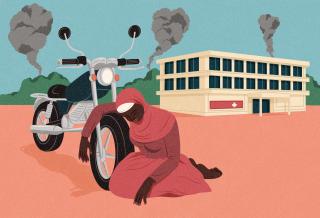
When the symptoms get worse, women often decide to return to the person who performed the abortion or to untrained care providers, which further increases delays in seeking care and accessing adequate treatment. Women initially try to manage the symptoms at home with medicines they have bought themselves (including pharmaceuticals and traditional treatments).
Delays in accessing care are compounded by a lack of information about appropriate health facilities to care for the women. They must also find the money to pay for transport and cover the costs of treatment, as well as someone to accompany them. For example, most of the women who took part in the study didn’t know that services at Bangui hospital were provided free of charge.
Aggravating factors in Nigeria
While admissions for abortion-related complications are rarer in the Nigerian hospital than in the Central African hospital (four per cent of admissions against 20 per cent, respectively), more than two-thirds of the women surveyed in Jigawa State presented with a severe complication.
Chronic anaemia among women in this very poor rural region probably worsens the complication. This could go some way towards explaining the higher proportion of women with severe complications. Sixty-seven per cent of women with no significant bleeding had anaemia (compared with 38 per cent in the Central African Republic), suggesting that they probably had underlying chronic anaemia.
National surveys have confirmed this data, showing that the proportion of women of childbearing age with anaemia in Jigawa State is one of the highest in the country.National Population Commission (NPC) [Nigeria], ICF. Nigeria Demographic Health Survey 2018. 2019. p. 748. https://dhsprogram.com/publi cations/publication-fr359-dhs-fnal-reports.cfm. Accessed 8 Feb 2023
In addition, 61 per cent of abortion-related complications occurred during the second trimester, i.e. later than in the Bangui hospital, which may also explain why they were more severe.
Unsafe abortion remains one of the leading causes of maternal mortality in the world, and the only one that is almost entirely preventable.
“In fragile or conflict-affected settings, as elsewhere, in order to save the lives of many women and reduce their suffering, we need to provide access to free contraceptive services offering a wide range of methods, both in general healthcare centres and in hospitals,” says Dr Estelle Pasquier, a medical researcher at Epicentre and co-leader of the AMoCo study.
“We need to invest in improving communities’ knowledge of safe contraceptive and abortion methods, and make post-abortion care and safe abortion care easily accessible, including at basic healthcare level.”
*Names changed to protect identity.
**AMoCo : Abortion-related Morbidity and mortality in fragile and Conflict-affected settings. Conducted in collaboration with the Central African Republic and Nigerian Ministries of Health, co-funded by MSF and ELRHA/R2HC, the AMoCo study gathers data from 1,068 women presenting with abortion-related complications.



